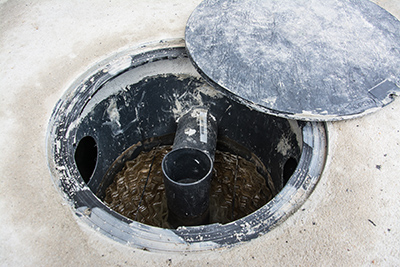
Before the Winter
Always keep your septic system well maintained; a well-maintained septic system is better able to withstand the stresses of winter weather. Take these steps to protect your septic system.
Know and document all components of your septic system. Take photos of the connections and system components. These photos will be helpful if components are destroyed and you need to replace them or file insurance claims. Make sure your photos and/or documents include:
- Septic tank location
- Septic system records or drawings
- Electrical components
Check for and repair any leaking plumbing fixtures. Small trickles of water can freeze within the pipe and eventually cause the pipe to freeze solid.
Let the grass in your lawn get longer in the late summer/fall over the tank and soil treatment area to provide extra insulation.
Consider wrapping your pipes with heat tape if you have high-efficiency appliances that generate small amounts of water.
Make sure the land around the manhole covers is sloped downwards so that snow melt flows away from the system
Avoid compacting the soil around the system. Compacted soil provides less insulation than uncompacted soil. Never allow vehicle traffic or livestock above the tanks or on the drain field.
Check with a septic system service professional before doing any landscaping to make sure that your system complies with freezing depths for the area.
Consider adding more insulation to the system if your system is new, you have had issues with freezing in the past, or you have a mound system. Options include installing insulated pipes, adding insulation to tanks or manhole covers, or placing a layer of mulch (8-12 inches) over the pipes, tank and drain field. This mulch could be hay, straw, or any other loose material. Contact a septic system service professional for more information.
Check for open, broken or uncapped risers, inspection pipes, or manhole covers that may allow cold air in and cause freezing. Be careful around any openings to the system and contact a septic system service professional for any needed repairs.
Check for any water pooling near the drain field. Effluent released from a failing system may freeze and prevent further effluent from entering the soil. Contact a septic system service professional for any needed repairs.
During the Winter
If you will be gone for more than a week leave the heat on in your home and consider having someone come by and run warm water regularly to prevent pipes from freezing.
Limit all traffic above and near the system during freezing temperatures. Excessive foot traffic, pets, or other impacts can cause snow to compact and the system to freeze.
Avoid removing or compacting snow above the system. Compacted snow provides less insulation than uncompacted snow and cold PVC pipes and plastic risers may crack or break.
If you feel the system starting to freeze use warm water and spread out your laundry and dishwasher schedule to at least one warm load per day. Do not leave water running, as this will hydraulically overload the system.
If you will be gone for several months, follow the steps listed above and check with a septic system service professional about having your septic tank pumped to prevent the effluent from freezing. In certain areas pumping the tank may cause it to pop out of the ground.
If your septic system freezes, call a septic system service professional. Do not add antifreeze, salt, or a septic system additive to the system. Do not run hot water continuously, start a fire over the system, or attempt to pump the sewage. Unless the cause of the freezing is corrected the system will probably refreeze next winter.
If you hear water constantly running into a pump tank or the pump turning on and off your system may be frozen. Shut off your pump and call a septic system service professional.
If your septic system cannot be repaired, contact a septic system service professional about using the septic tank as a holding tank until the system thaws naturally. If this complies with local code the tanks will need to be emptied on a regular basis. This can be costly. Reduce water use by limiting the number of toilet flushes, taking short showers, using the dishwasher at full capacity, and doing laundry at a laundromat.
Contact Morse Engineering and Construction for more information.
